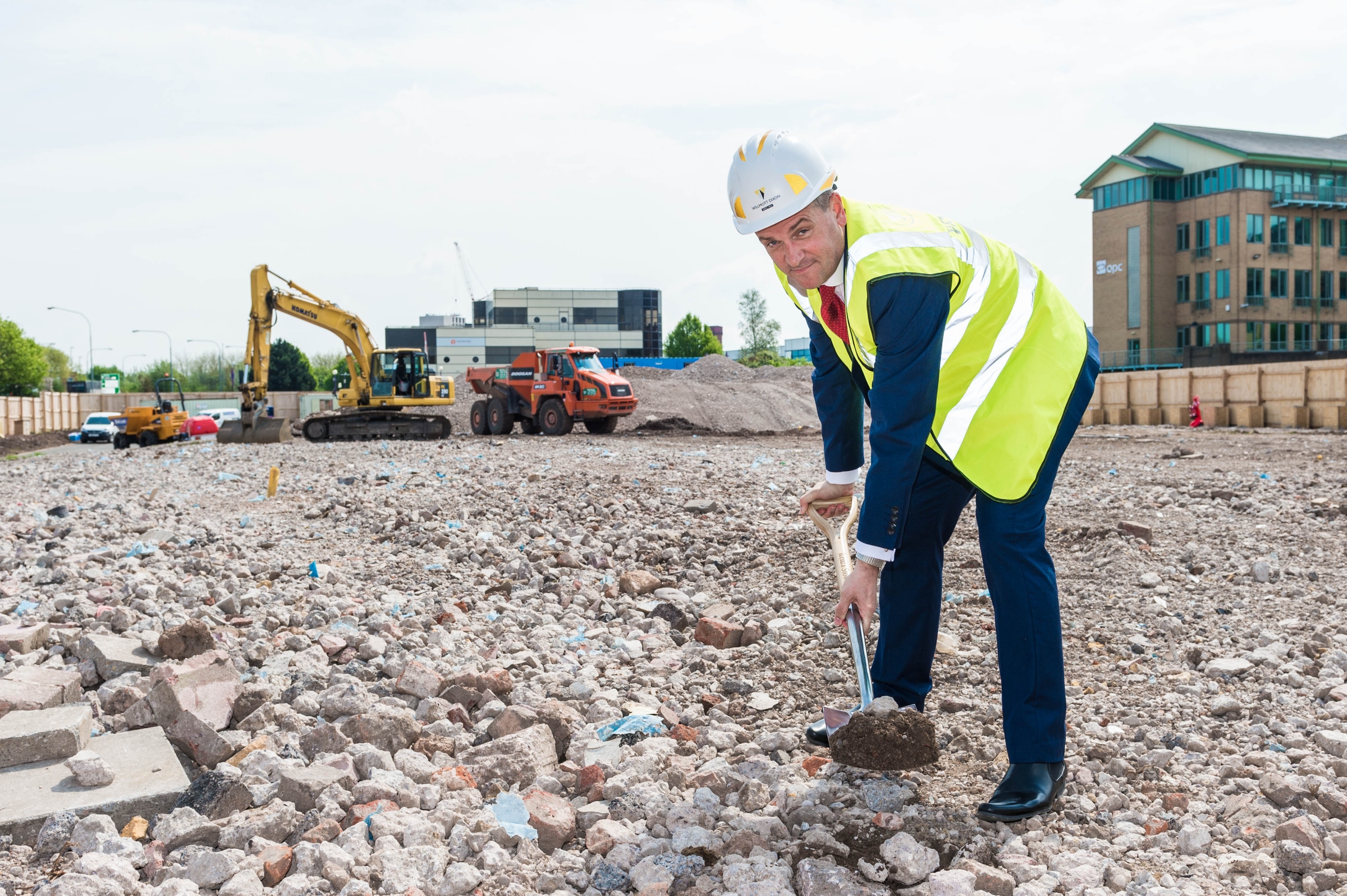Major step forward for National College for High Speed Rail as construction starts
Published: Monday 09 May 2016
Ground breaking ceremonies at Birmingham and Doncaster sites mark the start of construction of the National College for High Speed Rail (NCHSR).
Leader of Birmingham City Council John Clancy and College Chair Terry Morgan visited the Birmingham site.
The college will provide the specialist training, skills and qualifications required to build HS2 and future rail projects.
The National College for High Speed Rail took a significant step forward today, Monday 9 May, as construction officially began on its two sites in Birmingham and Doncaster.
The breaking-ground ceremony launched the official start of construction on the two sites, in Birmingham's Learning Quarter and at Doncaster's Lakeside. The college is on track to open its doors to students in September 2017.
This is the latest milestone for the new high tech training facility, which will provide Britain's workforce with the specialist training, skills and qualifications required to build HS2 and future rail infrastructure projects.

(Councillor John Clancy, Leader of Birmingham City Council at today’s National College for High Speed Rail ground-breaking ceremony).
Minister of State for Transport Robert Goodwill said:
This landmark moment means we are one step closer to seeing students walk through the doors of the College in 2017, learning the cutting-edge skills we need to deliver HS2 and world-beating rail infrastructure.
This shows the transformational effect that HS2 is already having on our country - boosting skills, generating jobs and supporting economic growth - before spades are in the ground next year
Terry Morgan, Chair of the Corporate Board for the National College for High Speed Rail, said:
The National College for High Speed Rail is progressing at an excellent pace and I am delighted that construction is underway on both sites in Doncaster and Birmingham.
The College will have a major and hugely positive impact on the ability of the rail industry to develop a multi-skilled specialist British workforce, capable of building HS2 and future infrastructure projects.
It will be a catalyst for growth in both Doncaster and Birmingham that will bring new investment into the area and provide highly skilled jobs for local people
Birmingham City Council and Doncaster Council have carried out significant work in partnership with HS2 Ltd to help set up the structure of the College and develop the curriculum
Councillor John Clancy, Leader of Birmingham City Council said:
This new college is a fantastic opportunity to build skills in this city and it's really important that people across the whole of Birmingham benefit.
We have thousands of talented young engineers and scientists and this will be their chance to access world-leading, cutting-edge rail technology.
Birmingham will become the city of a thousand and one trades when we begin training an elite generation of high speed rail engineers
Andrew Cleaves, Greater Birmingham & Solihull Local Enterprise Partnership (GBSLEP) Director for Employment and Skills, said:
The National College for High Speed Rail will be a real game-changer for local people, which is why the LEP is proud to be investing £6m, alongside investment from Birmingham City Council too.
This college is part of a wider strategy to up-skill local people and, in turn, deliver economic benefit for the region and allow us to compete on a global scale
Birmingham City Council and Doncaster Council have carried out significant work in partnership with HS2 Ltd to help set up the structure of the College and develop the curriculum.
The College will equip thousands of students with the highly technical engineering skills required to build, operate and maintain a railway, including a strong emphasis on practical and virtual learning.
It will be open to a wide range of people including new entrants, existing workforce, students studying for a foundation degree in rail engineering, access students, mature entrants, higher apprentice rail engineering students, progression from L3 diploma rail engineering, continuous professional development and career changers.
Beth West, HS2 Ltd Commercial Director and member of the College Board, said:
The National College for High Speed Rail will help re-define what it means to be employed by the rail industry by attracting new people and providing the opportunity to create the diverse workforce that the industry aspires to.
It is vital that we act now to ensure we have enough skilled people to build HS2 and the College will provide specialist vocational training for the next generation of engineers and apprentices
HS2 will improve capacity across Britain's rail network, shorten journey times between major cities and boost the economy. It will support up to 100,000 jobs nationwide, create around 25,000 jobs during construction of Phases One and Two and create 2,000 apprenticeships.
